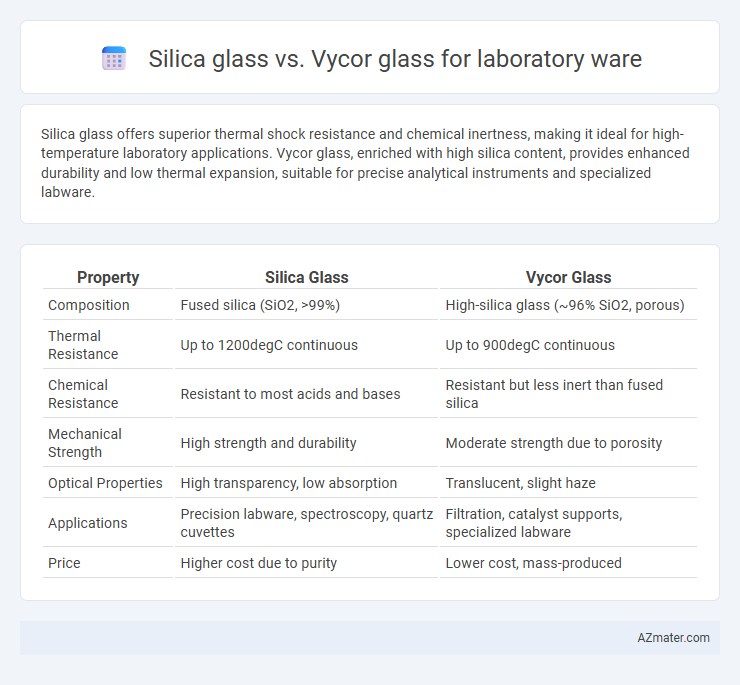Silica glass offers superior thermal shock resistance and chemical inertness, making it ideal for high-temperature laboratory applications. Vycor glass, enriched with high silica content, provides enhanced durability and low thermal expansion, suitable for precise analytical instruments and specialized labware.
Table of Comparison
| Property | Silica Glass | Vycor Glass |
|---|---|---|
| Composition | Fused silica (SiO2, >99%) | High-silica glass (~96% SiO2, porous) |
| Thermal Resistance | Up to 1200degC continuous | Up to 900degC continuous |
| Chemical Resistance | Resistant to most acids and bases | Resistant but less inert than fused silica |
| Mechanical Strength | High strength and durability | Moderate strength due to porosity |
| Optical Properties | High transparency, low absorption | Translucent, slight haze |
| Applications | Precision labware, spectroscopy, quartz cuvettes | Filtration, catalyst supports, specialized labware |
| Price | Higher cost due to purity | Lower cost, mass-produced |
Introduction to Laboratory Glassware Materials
Silica glass and Vycor glass are essential materials in laboratory glassware, known for their exceptional thermal stability and chemical resistance. Silica glass, composed of pure silicon dioxide, offers high transparency and excellent resistance to thermal shock, making it ideal for precise optical applications and high-temperature experiments. Vycor glass, a high-silica borosilicate material with approximately 96% silica content, provides superior durability and low thermal expansion, enhancing its suitability for repetitive heating cycles and rigorous chemical exposure in laboratory settings.
Overview of Silica Glass
Silica glass, composed primarily of pure silicon dioxide, offers exceptional thermal stability, chemical resistance, and optical clarity, making it ideal for laboratory ware requiring precision and durability. Its high melting point and low thermal expansion ensure minimal stress and breakage during rapid temperature changes, outperforming many alternative materials. Silica glass maintains purity without leaching contaminants, crucial for sensitive chemical reactions and analytical procedures in scientific research.
Overview of Vycor Glass
Vycor glass consists of high-silica content glass with approximately 96% silica and 4% boron oxide, making it highly resistant to thermal shock and chemical corrosion compared to standard silica glass. Its porous structure allows for exceptional thermal insulation and filtration capabilities, commonly used in laboratory applications requiring durability under extreme thermal cycles. Vycor glass's enhanced mechanical strength and acid resistance make it ideal for high-temperature experiments and corrosive chemical environments.
Chemical Composition Comparison
Silica glass is primarily composed of high-purity silicon dioxide (SiO2) with minimal impurities, providing excellent chemical resistance and thermal stability for laboratory ware. Vycor glass contains approximately 96% silica with the remainder comprising boron oxide and trace amounts of other oxides, which enhances its thermal shock resistance and chemical durability. The distinct chemical compositions influence their suitability, with silica glass favored for applications requiring ultra-high purity and Vycor preferred for thermal resilience and resistance to strong alkalis.
Thermal Stability and Resistance
Silica glass offers superior thermal stability with a high softening point around 1713degC, making it ideal for applications requiring exposure to extreme temperatures without deformation. Vycor glass, containing approximately 96% silica with borosilicate modifications, demonstrates enhanced thermal shock resistance and chemical durability, tolerating rapid temperature changes up to around 850degC. Laboratory ware made from silica glass excels in maintaining structural integrity under prolonged high-heat exposure, whereas Vycor is favored for experiments involving frequent thermal cycling due to its resistance to cracking and chemical corrosion.
Mechanical Strength and Durability
Silica glass offers exceptional mechanical strength and thermal shock resistance, making it highly durable for demanding laboratory applications involving rapid temperature changes. Vycor glass, a high-silica content glass ceramic, exhibits superior chemical durability and resistance to hydrofluoric acid, though it has slightly lower mechanical strength compared to pure silica glass. Both materials provide excellent longevity, but silica glass typically withstands physical stress better, while Vycor excels in aggressive chemical environments.
Chemical Inertness and Compatibility
Silica glass exhibits exceptional chemical inertness, resisting corrosion from acids, bases, and solvents, making it ideal for highly reactive laboratory environments. Vycor glass, composed mainly of high-silica content with a porous structure, also offers strong chemical resistance but is more susceptible to hydrofluoric acid and alkaline attack than pure silica glass. Both materials provide excellent compatibility with a wide range of chemicals, but silica glass outperforms Vycor in prolonged exposure to aggressive reagents due to its superior purity and dense structure.
Cost and Availability Analysis
Silica glass offers high availability and competitive pricing due to widespread production, making it a cost-effective choice for general laboratory ware needing thermal and chemical resistance. Vycor glass, with its specialized high-purity fused silica composition, commands a premium price and limited availability, suitable for advanced applications requiring superior thermal shock and chemical durability. Laboratories must weigh the lower cost and broader accessibility of silica glass against the enhanced performance characteristics and higher expense of Vycor glass when selecting materials.
Typical Laboratory Applications
Silica glass offers exceptional thermal shock resistance and chemical durability, making it ideal for high-temperature laboratory applications such as crucibles, reaction vessels, and optical components. Vycor glass, composed of high silica content with a porous structure, excels in applications requiring controlled porosity and thermal insulation, including filtration, dialysis, and high-temperature furnace tubes. Both materials are favored for their low thermal expansion and excellent chemical resistance, but silica glass is preferred for optical clarity while Vycor is chosen for specialized filtration and insulation tasks.
Choosing the Right Glass for Your Lab
Silica glass offers exceptional thermal resistance and chemical stability, making it ideal for high-temperature applications and exposure to aggressive chemicals. Vycor glass, a high-silica glass with about 96% silica content, provides superior thermal shock resistance and low expansion, suitable for labware requiring rapid temperature changes. Selecting the right glass depends on specific laboratory needs: opt for pure silica glass for extreme heat and chemical resistance, while Vycor is preferred for durability under thermal stress and precision experiments.

Infographic: Silica glass vs Vycor glass for Laboratory ware
 azmater.com
azmater.com